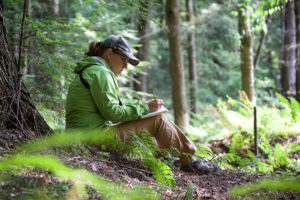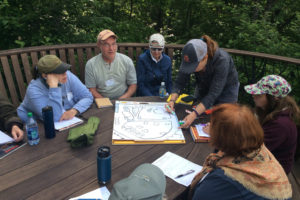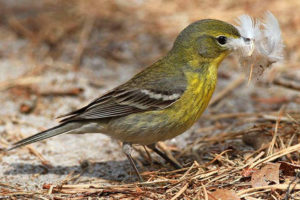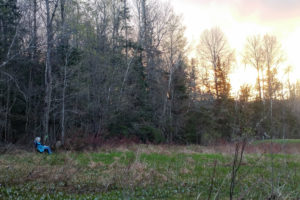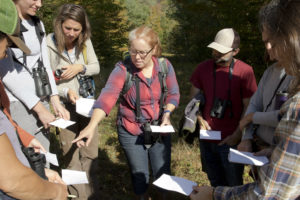Slow Birding: reimagining our connection with birds

Instructor: Bridget Butler
May 29-30, 2021 | $265
Course size: 12 students
Please Contact Us to request scholarship assistance.
S
ounds a bit strange, “slow birding.” Watching birds isn’t really fast in the first place and the pace of a birder in the field is already slow and methodical. But, it is possible to change how we approach traditional birding and what we get out of it. Slow Birding is a practice that builds a deeper observation of birds with the intention of knowing more about the whole bird in addition to identification.
Birding or bird watching is one of the top three hobbies in North America. People spend thousands of dollars a year on equipment, guides, birdseed, feeders, and travel in order to enjoy birds. Birds are everywhere, from cities to farmlands, from the mountains to the shorelines. Birding can be competitive and methodical or it can be mindful and meditative.
The Slow Birding approach is useful for beginner birders and experienced birders alike. Beginning birders find it a more relaxed approach to learning birds and experienced birders enjoy the feeling of letting go of the list and seeing birds with a fresh perspective.
Bird Diva Bridget Butler will share the practice of Slow Birding and how you can awaken your innate birding skills and reconnect with nature. She’ll share a variety of techniques that will help you look at birds, listen to them and interpret their behavior that will not only build your skills as a naturalist but will provide you with a practice that will allow you to slow down and reconnect with the natural world.
Course Goals and Objectives
- Participants will learn how to create a practice of observing birds using the sit spot method
- Participants will explore strategies for notetaking and mapping observations
- Participants will practice the birding by impression approach to identifying birds
- Participants will develop skills to recognize bird vocalizations and describe what they’re hearing
- Participants will learn how to interpret a variety of bird behaviors
- Participants will learn how to read the landscape in relation to birds
About the Instructor(s)
Bridget Butler, AKA The Bird Diva, has been working in conservation and environmental education for more than 20 years throughout New England. Her business Bird Diva Consulting has her traveling across Vermont delivering presentations, leading bird walks, and surveying birds for landowners. Bridget has worked for the Audubon Society in Vermont, Maine, New Hampshire, and Massachusetts and helped create Audubon Vermont’s Forest Bird Initiative. You may have seen her on local television talking about birds and conservation or heard her on Vermont Public Radio’s annual bird shows on Vermont Edition. As the Bird Diva, she feels it important that birders use their passion for birds to make a difference by helping to protect habitat for birds and other wildlife. Bridget lives in St. Albans with her husband and three young children who she’s grooming to be the next caretakers of this wild world!
Meals
Due to continued concerns around COVID-19, meals and beverages will not be provided this year. We ask that you please bring your own food.
Required Materials and Recommended Reading
Required:
- Birding by Impression: A Simpler Method for Field Identification by Kevin T. Karlson
- Why & How You Should Start A Sit Spot Routine - Mother Nature Network
- Introduction to Slow Birding Video Series by Bridget Butler (a link for these videos will be sent prior to the weekend)
Recommended:
- Stokes Nature Guides: Bird Behavior Volumes 1-3 by Donald & Lillian Stokes
- Field Guide to Bird Sounds of Eastern North America by Nathan Pieplow
- Zen Birding by David M. White and Susan M. Guyette
- What the Robin Knows by John Young
Field & Classroom Gear
- Seat: You’ll be spending a few hours a day sitting in one spot – bring along a cushion, seat, chair that you can carry easily. (e.g. crazy creek, folding chair, hunting stool)
- Boots: Insulated, water-repelling for early morning dew, streamside walks & sits
- Binoculars: If you don’t have a pair, please let us know. We have a limited number to loan out for the weekend.
- Field Journal & Pencil: You’ll be asked to take notes during our sit spot sessions. These notes will help you contribute to the group debrief that follows each session. Pick a sturdy journal for both indoor & outdoor notetaking as well as a pen or pencil that will work in wet or cold conditions. (e.g. Rite in the Rain field books are great for this!)
- Water Bottle & Travel Mug: These two items are crucial during our sit spot sessions! Great to have a hot beverage during a cold morning sit.
Timing
Course begins 9 AM on Saturday at NBNC. Course begins on Sunday at a time of the instructor's choosing. Course concludes by 5 PM on Sunday.
Academic Credit / Professional Development
This course qualifies for 1 graduate-level science credit for an additional $150 course fee. All BioU courses are accredited by Castleton University. It is the student’s responsibility to ensure that home institutions will accept the credit. Participants pursuing academic credit will be required to complete an additional assignment above and beyond the course hours, including literature review, reflective writing, or a field-based project.
This course qualifies for 20 hours of professional development hours and continuing education units. Certificates of completion are provided at the conclusion of the course.
Cancellation Policy
While we realize that unexpected circumstances arise that are out of our control, North Branch Nature Center cannot guarantee refunds for registrations cancelled within 30 days of the course. If a cancellation occurs within this window, NBNC will attempt to fill the space from our wait list and provide a full refund. If the course needs to be cancelled within 30 days of the program, NBNC will provide a full refund. If you need to cancel due to concerns related to COVID-19, a full refund will be provided up to 48 hours before the course.

713 Elm Street
Montpelier, Vermont 05602
(802) 229-6206
Hours: Center Open Monday-Friday 9-4
Trails Open 24/7

